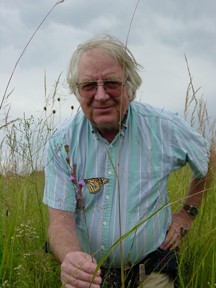Monarch Weekend at Crossroads
- Share
- Tweet
- Pin
- Share
By Monarch Weekend at Crossroads is a celebration of the monarch butterfly and other insect pollinators, but after hearing from the keynote speaker, Dr. Lincoln Brower, we fear that the beautiful orange and black butterflies may be the modern version of “canaries in the coal mine.”
The term “canary in the coal mine” refers to a practice dating back before the advent of ventilation systems and carbon monoxide/methane gas detectors. Coal miners would take a perky yellow bird into the mines, and if the canary died, the miners knew something was dreadfully wrong and would evacuate the coal mine as soon as possible.

Dr. Lincoln Brower, keynote speaker at Monarch Weekend.
Because monarchs migrate from Mexico to the Upper Midwest of the U.S. and Canada, these butterflies have been recognized by a number of conservation groups as a species “in need of close monitoring and protection” throughout their amazing range. So, just as coal miners supposedly watched their canaries, researchers from Canada, the United States and Mexico collaborate to watch monarchs. If they are thriving, we know that environmental conditions are good.
Unfortunately, monarchs are in decline, as are domestic and wild bees, and other insect pollinators.
World-renowned monarch expert Dr. Lincoln Brower has studied the monarch overwintering site in Mexico since 1977. He states, “the dwindling monarch butterfly winter residence in Mexico is ominous.”
“This [winter of 2013] is not just the lowest population recorded in the 20 years for which we have records,” Brower said. “It is the continuation of a statistically significant decrease in the monarch population that began at least a decade ago.”
“To blame the low numbers of monarchs solely on what is happening in Mexico is misleading,” Brower continued. “The historical decline over the past 19 years has multiple causes. All three countries need to face up to the fact that it is our collective activities that are killing the migratory phenomenon of the monarch butterfly.”
On June 9, at 7 pm, Brower will present Monarchs and Biodiversity. He will discuss his research and explain various threats to these remarkable migrating insects – loss of habitat in Mexico, farming practices in the central United States, and habitat fragmentation and decreases of biodiversity here in the summer range of the monarch.
Wild Ones of Door County are involved in the Wild for Monarchs program and are encouraging “people who care deeply about their environment and their connection to nature, to provide food and shelter for monarchs and other pollinators.”
As part of the Monarch Weekend event, on June 8, at 10 am, Master Gardener and Wild Ones member, Chriss Daubner will present the slide lecture, Inviting Butterflies to Your Property. Daubner created a stunning butterfly habitat by planting and maintaining a prairie with nectar-producing flowers that bloom throughout the growing season. She will help Door County gardeners improve the biodiversity of their own property by creating a monarch wayside.
Saturday afternoon, Crossroads will host a one-hour, hands-on (outdoor, weather permitting) family program on monarchs. This program is free and open to the public. At 2 pm, anyone who wishes to spend time in the field with Brower and his research colleague Julie Hein-Frank are invited to join a car caravan from Crossroads to Newport State Park (or meet the group at Newport by 3 pm).
Sunday afternoon at 2 pm, Crossroads will offer a cross-generational class called Meet the Monarch. In this activity, one adult and one youth (age 7-12) take part in a multimedia class. This class is free, but pre-registration is required. To register, call 746.5895.
For more information visit crossroadsatbigcreek.org.

